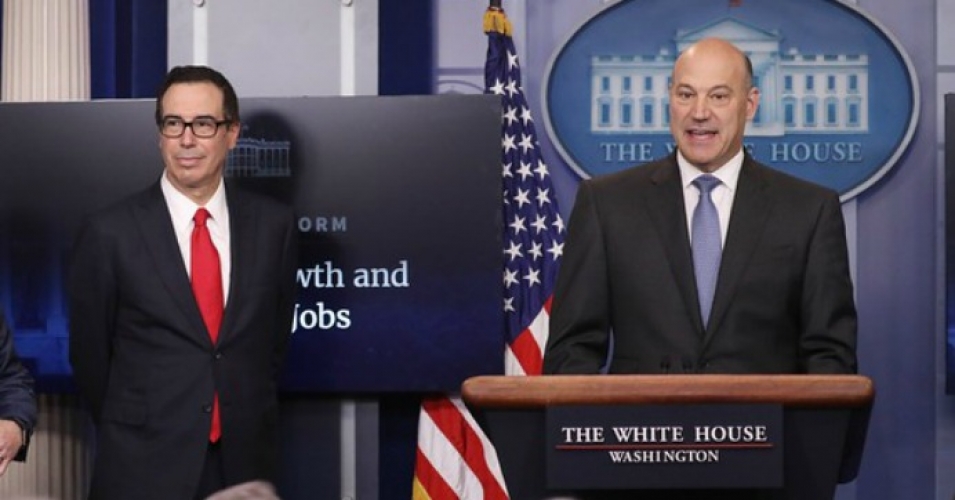Tematica’s Take on Trump’s Tax Proposal
This week a one page outline was released for President Trump’s tax plan, which includes slashing the corporate tax rate to 15 percent from 35 percent, reducing and simplifying individual tax rates and a “one-time” lower repatriation tax, (at a rate TBD) for the more than a trillion dollars in corporate cash being held outside the US. While policy proposals such as these tend to be fraught with negotiations and pushback that could ultimately alter the final outcome, it’s already being reported that House Speaker Paul Ryan on Wednesday said Trump’s plan is 80 percent aligned with House Republican proposals. That likely raises the probability of Trump’s plan getting more support than the first attempt at repealing and replacing the Affordable Car Act, but even so, it still doesn’t guarantee passage.
From our perspective, there are several questions left to be answered (the proposal was less than 200 words after all), including the eventual Congressional Budget Office scoring on the deficit potential, but directionally speaking investors should ask, “Who benefits?” There are thousands of companies across the S&P 500 and S&P 1500 as well as the Wilshire 5000, but individual investors are likely to look for a handful of stocks that could see a relatively outsized reduction in their tax burden should the corporate tax rate be reduced.
Said another way, which companies are likely to see a dramatic drop in their corporate tax rate even after some Washington haggling occurs?
Here are a few:
- Aging of the Population candidate CVS Health (CVS), which derives nearly 100 percent of its sales inside the United State and had reported tax rates of 38-39 percent in 2015 and 2016;
- Wealth management and online brokerage company Charles Schwab (SCHW), another Aging of the Population candidate, is also predominantly U.S. focused when it comes to its revenue stream and its 2015-2016 tax rate was 36.5-37.0 percent;
- A third example is Southwest Airlines (LUV), which resonates with our Cash-strapped Consumer investing theme, which recorded corporate tax rates of 35.5-37.1 percent over the last few years.
- While its reported corporate tax rate was lower than the above three companies, Connected Society company Verizon (VZ) would also see its bottom line vastly improved should the corporate tax rate fall meaningfully from the 31-34 percent rate it paid in 2015 and 2016.
In any of the above cases, a meaningful tax cut would allow a far greater percentage of the company’s operating profit to fall through to its net income line, which in turn would lead to a meaningful improvement in reported earnings per share. The lingering question is whether investors would see through that below the operating line improvement in earnings per share or fall into the trap of “faster earnings growth year over year means greater P/E multiple expansion?”
In our view, it rather resembles a cousin to investors paying stretched valuations for earnings growth that has been fueled by stock repurchase initiatives, especially if reported net income actually fell year over year.
Odds are there will be much back and forth in Washington over the coming weeks and months as even the White House has backed off Treasury Secretary Steven Mnuchin’s goal of passing tax reform by August, setting a new year-end target date in the process.
Getting back to House Speaker Ryan’s 80 percent comment, it means there is some 20 percent that would need to be reworked. One area that has been mentioned is the border adjustment feature, which has been viewed as one way to fund President Trump’s infrastructure program. That spending initiative, which is sorely needed per the latest report card from the American Society of Civil Engineers, would be a boon to companies ranging from Caterpillar (CAT) to Granite Construction (GVA) and other infrastructure related ones.
In its current form, Treasury Secretary Steven Mnuchin has said the border adjustment tax doesn’t work, but as Washington gets ready to haggle over Trump’s tax plan it could mean the border adjustment tax gets rethought as well. If so, we could see investor concern over rising costs for apparel companies that source heavily outside the US as well as those outside the US that derive a meaningful portion of revenue and profits from sales inside the U.S. Examples of the former would include Gap (GPS) and Michael Kors (KORS), while the latter would be companies lie Diageo (DEO) and Unilver plc (UL).
As the back and forth gets underway in Washington, investors should continue to search for companies that could benefit from lower corporate taxes and do their due diligence on the underlying business. Given our thematic investing strategy, we’d argue that as investors do that they should factor in the various tailwinds associated with our more than 15 investing themes into their thinking.
Looking at the bigger picture, the release of this one-page, sub-200 word outline understandably gave the market pause if only due to the brevity of the proposal, as we close in on the administration’s 100th day. The market rose dramatically post-election because investors believed that the new administration would usher in a more business-friendly regime that would stimulate the economy. The market’s weakness Wednesday was likely along the line of, “That’s it? Nearly 100 days in and that’s all you have for us?” This is one more area in which the market got ahead of itself based on hopes with reality being a bit less encouraging. In time, the administration may very well put together a comprehsive plan that is compelling to Congress, but with less than 200 words and only 7 numbers nearly 100 days in, the market is left scratching its head.


